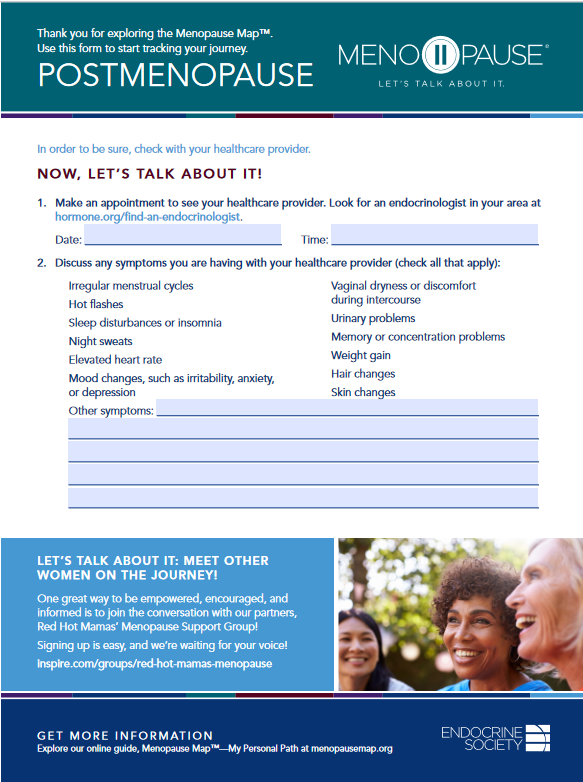“Most women become menopausal naturally
between the ages of 45 and 55 years,
with the average age of onset at around 51 years”.1
Umbrella
What may the Menopause Evidence-Based Information Umbrella include?
Depending on the Source (DotS) this Umbrella may include:
- Early Menopause
- Induced Menopause
- Menopause
- Perimenopause
- Premature Menopause
- Surgical Menopause
Menopause
What is menopause?
DotS the definition of menopause may vary. In Menopause: How Menopause Occurs, dated 16 October 2024, the World Health Organization’s definition is:
Menopause Age
What is the average age of menopause?
In What Is Menopause? Definition of Menopause the Australasian Menopause Society explain:
Menopause Symptoms
What are some menopause symptoms?
In  Symptoms of Menopause: Physical and Emotional Symptoms the (Australian) Jean Hailes for Women’s Health (JH) elaborate on:
Symptoms of Menopause: Physical and Emotional Symptoms the (Australian) Jean Hailes for Women’s Health (JH) elaborate on:
Physical symptoms may include:
- Irregular periods
- Hot Flushes
- Night sweats
- Sleep problems
- Sore breasts
- Itchy, crawly or dry skin
- Exhaustion and fatigue
- Dry vagina
- Loss of sex drive (libido)
- Headaches or migraines
- More pronounced premenstrual syndrome (PMS)
- Aches and pains
- Bloating
- Urinary problems
- Weight gain due to a slower metabolism
Psychological and Emotional Symptoms
Psychological and emotional symptoms may include:
- Feeling irritable or frustrated
- Feeling anxious
- Difficulty concentrating
- Brain fog
- Forgetfulness
- Lowered mood
- Mood swings
- Feeling you can’t cope as well as you used to”.4
Menopause Symptoms Duration
What is the average duration of menopause symptoms?
On page one and two in Optimising the Menopause Transition: Joint Position Statement By the British Menopause Society, Royal College of Obstetricians and Gynaecologists and Society for Endocrinology on Best Practice Recommendations for the Care of Women Experiencing the Menopause, first published online 10 June 2022, the authors note:
Healthy Lifestyle
Can a healthy lifestyle improve menopause symptoms?
In the Joint Position Statement By the British Menopause Society, Royal College of Obstetricians and Gynaecologists and Society for Endocrinology on Best Practice Recommendations for the Care of Women Experiencing the Menopause, first published online 10 June 2022, one of the recommendations is:
- “Women should be advised that implementing or maintaining a healthy lifestyle can improve menopause symptoms. A healthy diet (one low in saturated fat and salt and rich in calcium and vitamin D), stopping smoking, reducing alcohol intake and including regular exercise can be beneficial. Reducing caffeine intake may also improve symptoms”.6
Treatments
What treatments are available?
On page one in Emotional Wellness In Menopause: What Treatments Are Available? the (British) Women’s Health Concern elaborate on:
- Anti-depressants can help with emotional and cognitive symptoms of the menopause. However, unless you have been diagnosed with depression, there are other treatments which may be more helpful and appropriate
- Hormone Replacement Therapy (HRT) can help with many cognitive and emotional symptoms of menopause. HRT can also help improve quality of sleep. It’s useful to keep a record of symptoms to discuss with your HRT prescriber as this will help identify the best HRT regime for you
- Cognitive Behavioural Therapy (CBT) and other talking therapies can be hugely beneficial in dealing with some of the emotional symptoms of menopause. Even women who have never used therapies before and them helpful to navigate their menopause journey
- Mindfulness and meditation are popular techniques to help relax and clear the mind – a very useful addition to managing some of the emotional and cognitive symptoms of menopause. Alongside restorative exercise such as yoga and Pilates, both body and mind can recover and heal”.7
Health Care Provider
What if I would like help with my menopause?
If you would like help with your menopause, it may be in your best interest to choose to talk to your health care provider about this.
In What Is Menopause? When To See Your Doctor the JH explain:
- Irregular periods
- Heavy bleeding
- Bleeding after menopause
- Increased premenstrual syndrome (PMS) symptoms
- Menopausal symptoms, such as hot flushes, that interfere with your daily life”.8
In Menopause: Diagnosis & Treatment – Treatment the (United States) Mayo Clinic encourage us to seek help:
Health Topics A-Z
Where may I find Health Topics A-Z related to Menopause Evidence-Based Information?
In Health Topics A-Z you may find:
Links
Where may I find Links related to Menopause Evidence-Based Information?
Your Country may have Links similar to:
Links
This Links List to third party websites is neither comprehensive nor exhaustive. Inclusion on this Links List does not imply endorsement or recommendation. Non-inclusion on this Links List does not imply non-endorsement or non-recommendation. Third party websites are not under the control of Meno Martha International Menopause Directory. Third party websites may contain explicit medical images and/or sexual references. Please read Meno Martha International Menopause Directory’s Links Policy before proceeding to a Link. Please contact Webmaster if you experience a problem with a Link.New or Updated
- Consumer Video and Podcast Series: 2025 Consumer Videos and Podcasts – Nutrition At Menopause and Why It Is Important [12 February 2025]
- Menopause and Sleep [February 2025]
- Midlife Weight Gain [March 2025]
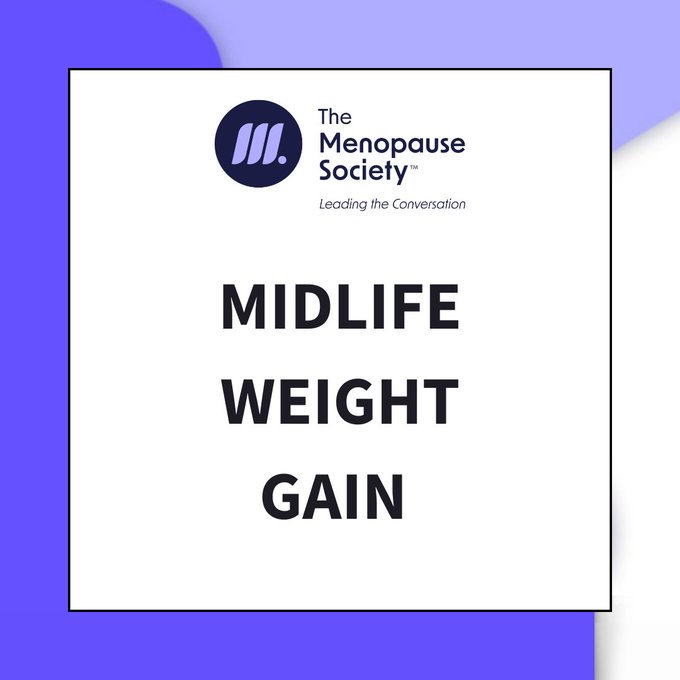
- Webinars: Previous – IMS & ISE Symposium: What’s Hot? Options for Treatment of Hot Flushes 2025 [12 March 2025]
- Webinars: Previous – The Perimenopause Journey: An Adaptive Reproductive Phase
Bioidentical Hormones
Complementary and Integrative Health and Menopause
- Consumer Video and Podcast Series: 2023 Consumer Videos and Podcasts – NAMS 2023 Nonhormone Therapies Position Statement for Bothersome Menopause Symptoms
- Menopause and Natural Therapies
- Non-Estrogen Treatments for Menopausal Symptoms
- Nonhormone Treatments for Hot Flashes and Night Sweats
- The Truth About Menopause Supplements | Dr Sarah Berry
- Using Natural Therapies In the Menopause Transition – Webinar
Hormone Therapy
- HRT Questions Answered
- Hormone Therapy: Is It Right for You?
- The Menopause Society Statement on Misinformation Surrounding Hormone Therapy
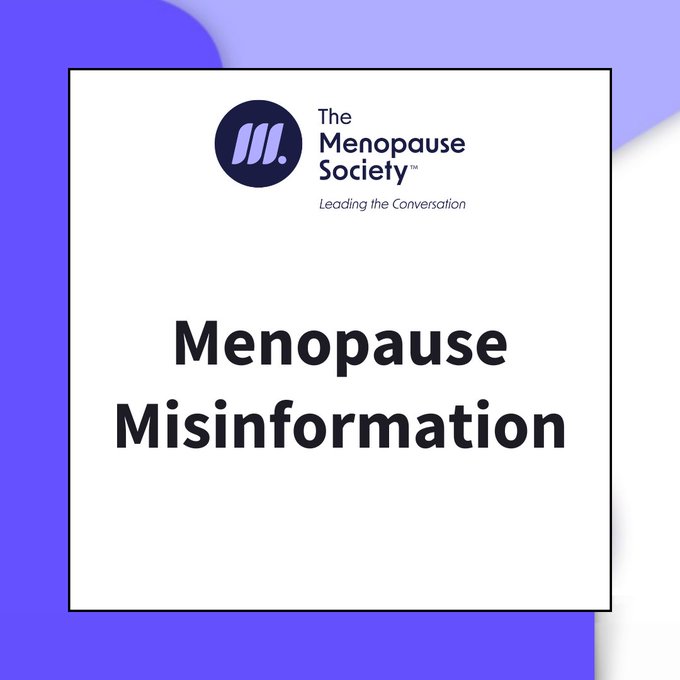
- Videos & Podcasts: Videos – Menopause and Hormone Therapy: Current Perspectives and Controversies
- Webinars: Previous – IMS & ISE Symposium: What’s Hot? Options for Treatment of Hot Flushes 2025
- World Menopause Day 2024: Leaflet for Women – Menopause and Menopause Hormone Therapy [Multiply Languages]
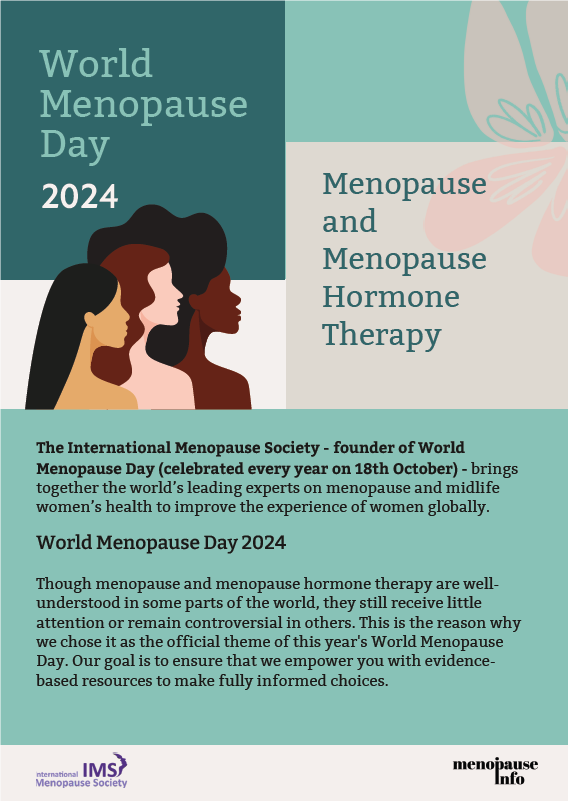
- World Menopause Day 2024: Poster for Women – The 5 Ws of Menopause Hormone Therapy (MHT)
Hot Flushes
- 8 Myths and Truths About Menopausal Hot Flashes
- Consumer Video and Podcast Series: 2023 Consumer Videos and Podcasts – New FDA-Approved Nonhormone Option for the Treatment of Hot Flashes
- Hot Flashes
- Hot Flashes
- Hot Flashes: What Can I Do? [+ Video: What Are the Signs and Symptoms of Menopause?]
- Mayo Clinic Minute: Help With Hot Flashes Due To Menopause [+ Video Courtesy: Mayo Clinic News Network]
- Nonhormone Treatments for Hot Flashes and Night Sweats
Menopause
- Askearlymenopause.org [Ask EM] [+ Video: What Is Early Menopause?]
- BMS TV: Menopause Explained
- Consumer Video and Podcast Series: 2024 Consumer Videos and Podcasts – Preparing for Your Menopause Health Care Visit
- Experts Answer Your Menopause Questions In New Video
- First Symptoms of Menopause
- How To Talk To Your Doctor About Menopause
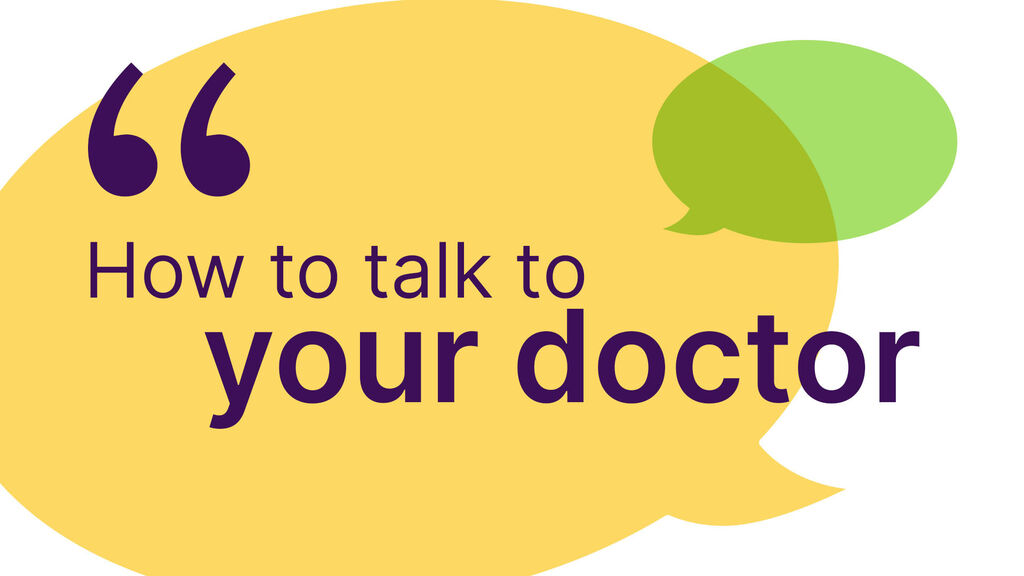
- Later Years (Around 50 Years and Over): Menopause and Post Menopause Health – Menopause [+ Video: Menopause Myths] [Other Languages and Formats]
- Menopause
- Menopause
- Menopause
- Menopause
- Menopause
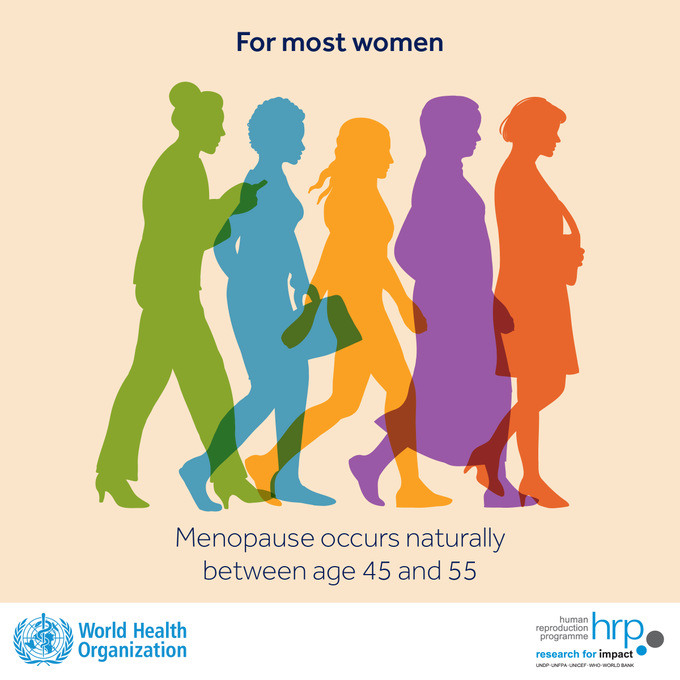
- Menopause Checklist Podcast
- Menopause Map: Downloadable Resources – My Personal Path Print Tools: Questions for Your Health Care Provider

- Menopause: Identification and Management [NICE Guideline Published: 12 November 2015 Last Updated: 07 November 2024]

- Menopause: Identification and Management: NICE Guideline [NG23] Published: 12 November 2015 Last Updated: 07 November 2024
- Navigating Menopause: Honest Answers To All Your Questions [+ Video: What To Expect in Menopause]
- Premature and Early Menopause
- Shedding Light on the Menopause Experience and Demystifying Treatment
- What Is Menopause? [+ Video]
Menopause Diagnosis
Menopause Glossary
Menopause Health Care Providers
Menopause In Multiply Languages
Menopause Memory
Menopause Mood Changes
- 5 Ways To Cope With Menopausal Mood Swings
- Emotional Wellness In Menopause
- Mastering Midlife Mood Changes With Marlene Freeman, MD
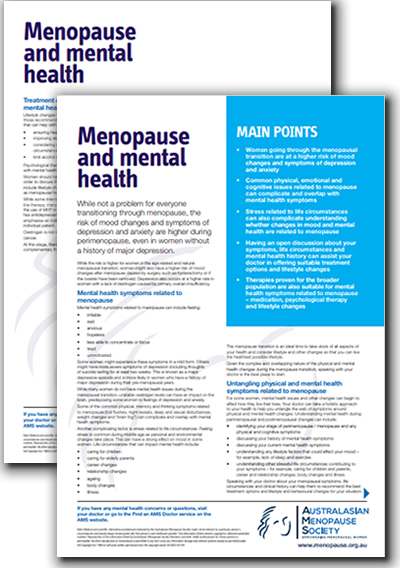 Menopause and Depression: Is There A Link?
Menopause and Depression: Is There A Link?- Menopause and Mental Health
- Menopause and Mental Health
- Mood and the Menopause
- Self-Help Tool: Menopause and Mental Wellbeing
Menopause Symptoms
- Later Years (Around 50 Years and Over): Menopause and Post Menopause Health – Signs and Symptoms of Menopause [+ Video: Talking Menopause With Your GP] [Other Languages and Formats]
- Managing Menopause Symptoms [+ Video Courtesy: Mayo Clinic News Network]
- Menopause Map: Downloadable Resources – My Personal Path Print Tools: Symptom Tracker
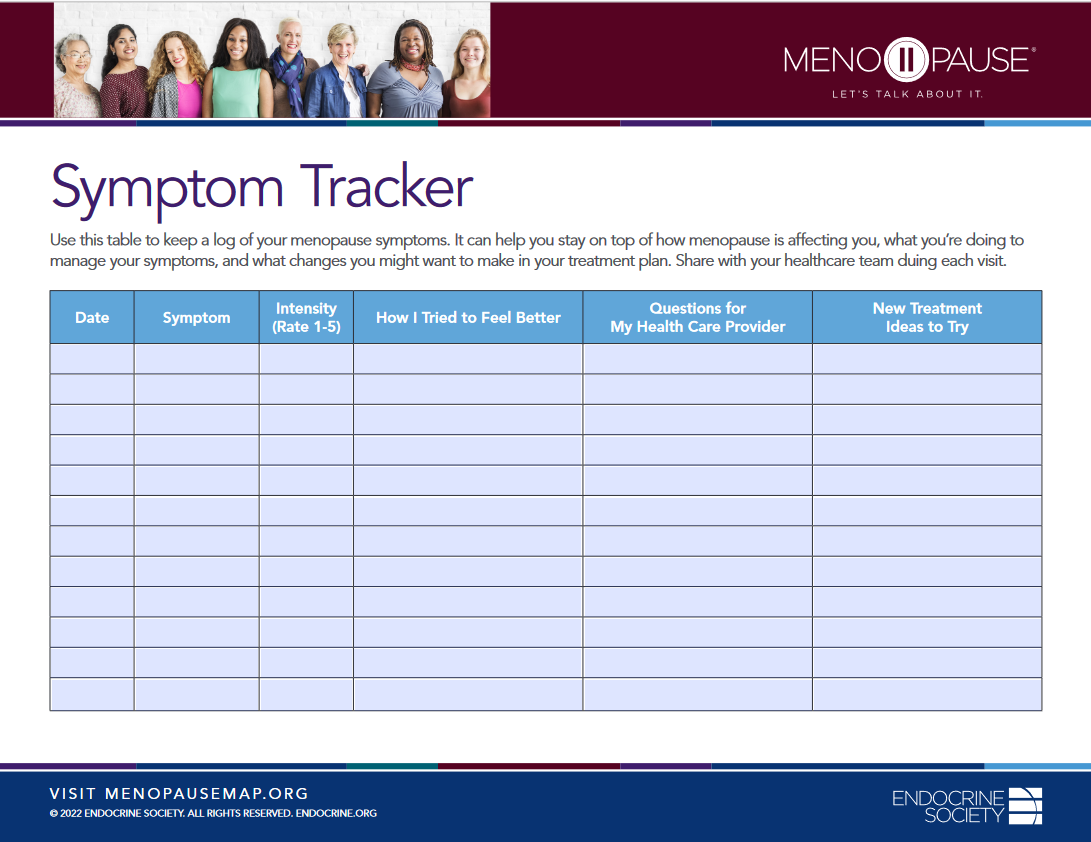
- Menopause Symptoms: Mayo Clinic Expert Outlines Hormone and Nonhormonal Therapies
- Menopause: Symptoms & Causes
- Perimenopause and Menopause Symptom Checklist
- Symptoms of Menopause
- Tips To Help Manage Menopause Symptoms
Menopause Videos
- BMS TV
- Consumer Video and Podcast Series: 2025 Consumer Videos and Podcasts – Delaying Menopause Through Ovarian Tissue Freezing
- Later Years (Around 50 Years and Over): Menopause and Post Menopause Health – Menopause and the Workplace
- Menopause Mindfulness: Living Your Best Work-Life Through the Menopause Transition
- Menopause Patient Information [Videos]
- Menopause Preparedness Toolkit Video Series
- Videos & Podcasts: Videos – Vulvar Diseases, Overview for Aging Women
- Webinars: Previous – Recommendations on Cardiovascular Risk Assessment
- Why Is FSH Not Needed for Diagnosis of Menopause
Perimenopause
- Let’s Talk About Perimenopause
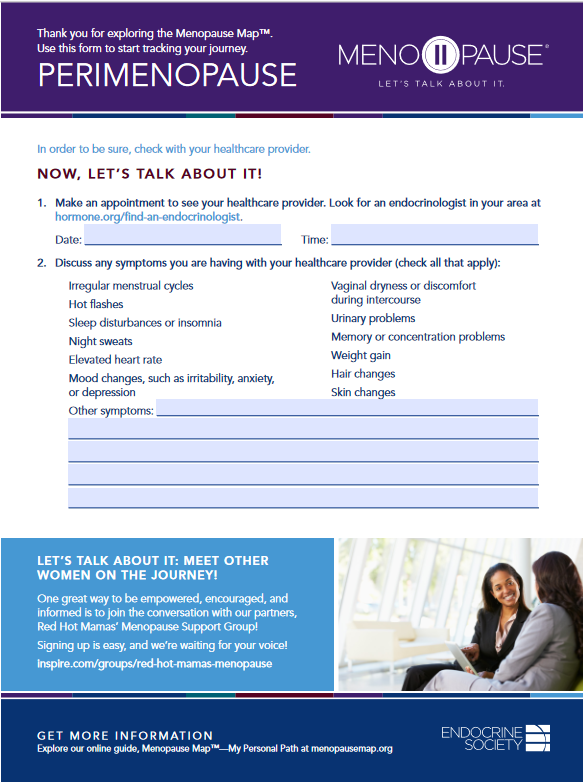 Mayo Clinic Minute: Perimenopause and Menopause [+ Video]
Mayo Clinic Minute: Perimenopause and Menopause [+ Video]- My Periods Have Changed. Is Menopause Around the Corner?
- Perimenopause
- Perimenopause
- Perimenopause and Menopause Checklist: Translated Checklists
- Perimenopause and Menopause Symptom Checklist
- Stages of Menopause: Downloadable Resources – Stages of Menopause: Perimenopause
- Webinars: Previous – The Perimenopause Journey: An Adaptive Reproductive Phase
- When Does Perimenopause Start and How Do You Define the Beginning
Postmenopause
Sources
Where may I find the Sources quoted?
You may find the Sources quoted at:
Sources
- What Is Menopause? Definition of Menopause. Content Created May 2022. Australasian Menopause Society https://www.menopause.org.au/hp/information-sheets/185-what-is-menopause Accessed: 01 April 2025
- Menopause: How Menopause Occurs. 16 October 2024. World Health Organization https://www.who.int/news-room/fact-sheets/detail/menopause Accessed: 01 April 2025
- What Is Menopause? Definition of Menopause. Content Created May 2022. Australasian Menopause Society https://www.menopause.org.au/hp/information-sheets/185-what-is-menopause Accessed: 01 April 2025
- Symptoms of Menopause: Physical and Emotional Symptoms. Last Updated: 02 December 2024. Last Reviewed: 19 August 2022. Jean Hailes for Women’s Health https://www.jeanhailes.org.au/health-a-z/menopause/menopause-symptoms#physical-and-emotional-symptoms Accessed: 01 April 2025
- Hamoda, H, Mukherjee, A, Morris, E, Baldeweg, S. E., Jayasena, C. N., Briggs, P, Moger, S. Optimising the Menopause Transition: Joint Position Statement By the British Menopause Society, Royal College of Obstetricians and Gynaecologists and Society for Endocrinology on Best Practice Recommendations for the Care of Women Experiencing the Menopause. First Published Online 10 June 2022:1-2 https://journals.sagepub.com/doi/10.1177/20533691221104882 Accessed: 01 April 2025
- Hamoda, H, Mukherjee, A, Morris, E, Baldeweg, S. E., Jayasena, C. N., Briggs, P, Moger, S. Joint Position Statement By the British Menopause Society, Royal College of Obstetricians and Gynaecologists and Society for Endocrinology on Best Practice Recommendations for the Care of Women Experiencing the Menopause. First Published Online 10 June 2022:3-4. https://journals.sagepub.com/doi/full/10.1177/20533691221104879 Accessed: 01 April 2025
- Emotional Wellness In Menopause: What Treatments Are Available? Published Date: June 2023:1. Women’s Health Concern https://www.womens-health-concern.org/wp-content/uploads/2023/06/30-WHC-FACTSHEET-Emotional-wellness-in-menopause-JUNE2023-A.pdf Accessed: 01 April 2025
- What Is Menopause? When To See Your Doctor. Last Updated: 03 March 2025 | Last Reviewed: 19 August 2022. Jean Hailes for Women’s Health https://www.jeanhailes.org.au/health-a-z/menopause/about-menopause Accessed: 01 April 2025
- Menopause: Diagnosis & Treatment – Treatment. 07 August 2024. Mayo Clinic https://www.mayoclinic.org/diseases-conditions/menopause/diagnosis-treatment/drc-20353401 Accessed: 01 April 2025


